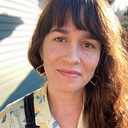Member-only story
The Crispness of My Secular Life
How Dropping Beliefs Has Connected Me More
For many years, I was obsessed with spirituality. And for many years, I was a devoted Buddhist in a Mahayana tradition (on my way to ordination in a ministerial program). This path, and the truly wonderful teachers I was fortunate enough to practice with, taught and grew me tremendously, but I understand only now that it was also deeply entangled with a core belief that there was something fundamentally wrong with myself and the world. I couldn’t see it at the time, but my fixation on spirituality was inextricably linked with developmental trauma and my (anxious) attachment style.
There may be a person or people who grew out of a white, modern, American context and are able to hear the Dharma in a way that is “free from obscurations”, but I am not one of them. I challenged the doctrine of my tradition relentlessly for years (my teacher called my personal holy order a “ministry of doubt”), and over time it became clear that I was simply incapable of mustering up the energy and sustained focus for the practices I was assigned. For years I blamed myself, assuming that I simply lacked the energy and focus of someone who could reach enlightenment in a single lifetime. But energy is limited, and it takes a tremendous amount of it to restrain the chaotic energies of unresolved trauma, anger, and self-doubt every time you sit…
